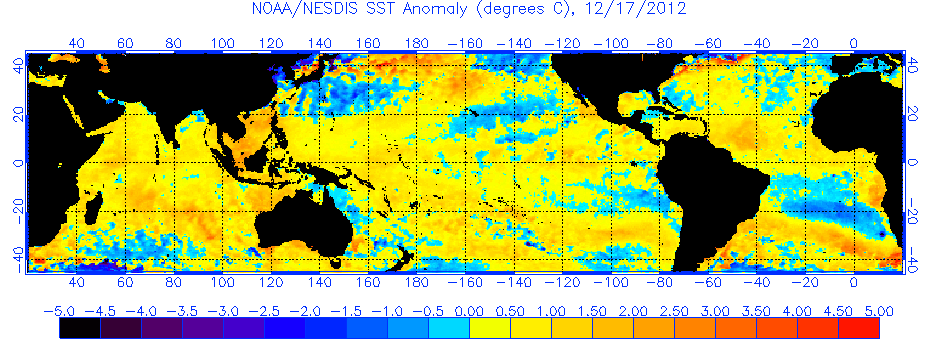Ocean Heat Came Back to Haunt Australia
Posted on 15 January 2013 by Rob Painting
Over the last 50 years an enormous amount of energy, equivalent to two Hiroshima bombs per second, has gone into heating the global oceans. Because of their much greater mass, the oceans have a thermal capacity roughly one thousand times greater than the atmosphere. This means that despite this huge increase in accumulated energy, the change in upper ocean temperature is small compared to that of global surface air temperatures.
Upper ocean heat buried beneath the surface layers doesn't necessarily remain in the ocean though. For instance, the largest year-to-year fluctuation in global temperature generally occurs in response to the Pacific Ocean phenomenon called the El Niño-Southern Oscillation (ENSO). Variation in ocean circulation and surface winds typically expose warmer-than-average sea surface water to the atmosphere during El Niño, and cooler-than-average sea surface water during La Niña episodes (check out this brilliant animation to understand the fundamental process). The resultant ocean-to-atmosphere heat exchange has a major influence on global surface temperature in any given year, and this works to obscure the long-term surface global warming trend when viewed at short intervals.
Due to the huge difference in heat capacities between the ocean and atmosphere, what may in fact be a small amount of ocean heat transforms into a major bout of atmospheric warming when this heat is transferred from the ocean to atmosphere. A poignant example is the record-breaking heat wave which has recently enveloped all of Australia.
A heat wave requires a number of 'weather fluctuation stars to align', so-to-speak, but the role of the ocean in this heat wave is demonstrated in the animation below - where a pulse of oceanic heat rapidly accumulates in the surface Indian Ocean around Western Australia and propagates eastward.

Figure 1 - Global sea surface temperature anomalies (departures from the average) for the period 17th December 2012 to 10th January 2013. The maps are from the US-based National Oceanic and Atmospheric Administration (NOAA). The temperature bar is in °C and the anomalies are relative to the long-term average at each location for that time of year.
The marine heat wave which contributed to this record-breaking Australian heat wave, may (hopefully) have been of short enough duration to prevent a mass mortality of marine life in the oceans around Australia, unlike a long-ish marine heat wave off Western Australia in early 2011, but that remains to be seen. Regardless, the vast accumulation of heat in the ocean going on right now may be "out of sight, out of mind" for many, but the extra heat being added to the upper levels of the ocean will have consequences for humanity, as this Australian heat wave amply demonstrates.
Like the giant European, Russian, and United States heat waves before this, the Australian heat wave will slowly fade in the collective memory of the public consciousness, but it may not be too long before another rears its head to inflict suffering. We have seen a historic increase in record-breaking temperatures globally (Hansen [2012]) and, due to the well-understood physically-based scientific foundation (weather fluctuations operating within a warmer background climate state), we have to expect more frequent and more intense heat waves in the future (although their proximate causes are likely to differ).
On our current trajectory, these extreme record-breaking summer temperatures are set to effectively become the norm by around mid 21st century (Anderson [2011]). If this occurs it will present a formidable challenge, not only to human society in the form of wildfires and such, but to human agriculture and the many natural ecosystems that afford us our current lifestyles and feed 7 billion people. It might prove useful for our global society to act in order to prevent this scenario from becoming reality, something not even attempted thus far. Our children and grandchildren might think it was very useful of us.
Relevant SkS posts on this topic include: Extreme Events Increase With Global Warming, Ocean Heat Poised To Come Back And Haunt Us?, Hansen's New Climate Dice - Hot, Loaded, and Misunderstood, An American Heatwave: The United States Glimpses its Hot Future, Quantifying Extreme Heat Events, Extreme heat becoming more likely under climate change, and Monckton Myth #9: Monckton vs Monckton on heat waves.































 Arguments
Arguments























 0
0  0
0






Comments